The economy is facing one its biggest dollar crunch in recent years with the banks and businesses alike feeling the bite.
The International Monetary Fund predicts Nigeria’s economy will contract by 5.4% this year, the most in four decades. The latest official job figures put the second-quarter unemployment rate at 27.1%, the highest in a decade.
The impact of low dollar earnings is reverberating across the economy, with banks and other companies taking new measures to stay in business. GTBank and First City Monument Bank (FCMB) have cut the amount of foreign currency customers can spend on payment cards abroad to $100 a month from $300. “If you require higher international spending limit, we encourage you to apply for a foreign currency card (Domiciliary Account required),” the FCMB said in emailed notes to customers.
Rise in dollar demand backlog estimated at over $3 billion has pushed the CBN into rationing dollars to companies and banks demanding the greenback.
- Read also:
- Wenger: Play World Cup/European Championship Every Two Years
- Lagos Implements New Economic Plan With Ehingbeti
- Tennis: Sinner, Stops Zverev To Reach Last Eight In Paris
Guaranty Trust Bank has delayed dividends payout to investors in its Global Depository Receipts (GDRs) due to difficulties in sourcing dollars, the bank disclosed yesterday.
In a note to GDR holders, the bank explained that its registrar – the company which maintains lists of bond and shareholders – was in a queue with the CBN for dollars to make the payout.
The Central Bank of Nigeria (CBN) has responded with policy measures to save forex. For instance, Godwin Emefiele, CBN governor, introduced new domiciliary account rules in which he directed that customers can deposit dollar into their domiciliary accounts but are not allowed to transfer it to another party.
He also announced a policy restricting importers of milk from accessing forex from official market and halted weekly interbank foreign-currency sales since March and only resumed on September 7.
On their part, the banks have cut access to dollars for individuals, businesses. Banks are not honoring card payments, many foreign investors are not able to get their money out and manufacturers are unable to import vital raw materials as output hurtles toward a second contraction in four years.
Bismarck Rewane, a -Lagos-based economist, said many foreign investors cash are trapped in Nigeria’s debt market as dollar liquidity dries up due decreased inflows and persistent drop in crude oil prices. Crude oil revenue constitute over 90% of forex earnings for Nigeria.



